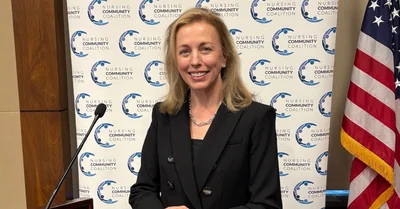Former college and professional athletes, along with U.S. Senators Maria Cantwell (D-Wash.), Cory Booker (D-N.J.), and Richard Blumenthal (D-Conn.), have voiced concerns that the SCORE Act, currently under consideration in the House of Representatives, could undermine recent advances in college athletes’ rights and protections. The virtual press conference was organized by major players associations, including the NFLPA, NBPA, NWSLPA, MLSPA, MLBPA, and NHLPA.
Senator Cantwell stated: “The SCORE Act is really…not what we think it is for the athlete. Let's just put it that way. It's not the solution for the athlete. You can say there's a lot of people scoring. Two big divisions and their commissioners, they're scoring. The NCAA, they're scoring. Okay, and now apparently private equity is scoring. Okay, but who's not scoring is the athletes.”
Senator Booker shared his perspective as a former student-athlete at Stanford University and highlighted systemic issues within college sports: “I’ve been really happy that we have been able to make a lot of gains in recent years and they were fought for by college athletes…themselves,” he said. “They won those gains. They earned them in court. They began to share in the revenues being created…, to see some of the money that they were principally generating through their athleticism. We are now seeing, stunningly, a bill come out called the SCORE Act that would halt the progress that these athletes made…which is just, to me, outrageous. We should be doing everything we can to empower athletes, protect their rights, protect their health, education, create stability for the sport so the next generation can have the same kind of life-changing opportunities that college sports gave me, and frankly more.”
Spencer Haywood recounted his experience challenging NBA eligibility rules through his Supreme Court case Haywood v. National Basketball Association: “So I joined the Seattle SuperSonics in Seattle, Washington,” said Mr. Haywood. “And so, in joining the Seattle SuperSonics, right away…they [the NBA] hit me with a lawsuit…an injunction saying that I cannot play because my fourth year [after high school] was not up. And I said I wanted to play. So Sam Schulman, the owner of the Seattle Supersonics, said ‘Let's fight this case.’ And I was up for a good fight...So I said I gotta fight this...We went to the District [Court] and all the way to the Supreme Court...and I won the case seven to two.”
Former NFL player Dwayne Allen expressed strong opposition to the proposed legislation: “None of us like or enjoy, really where college athletics is right now,” Mr. Allen said. “I believe we are in the growing pains…of change...but I don't believe that the SCORE Act is our solution…I love college athletics...But at what cost? The cost is voices...being null...It's saying...here are some antitrust exemptions so that we don't have to talk...I don't believe the gains [of] SCORE Act [are] worth the cost that it will take against college athletes...And thus I am in opposition...of Student Compensation and Opportunity through Rights and Endorsements Act.”
Meghann Burke from NWSLPA argued against treating universities as profit-driven entities: “If universities want to act like for-profit actors...They can return their federal funds,...pay taxes like every other private business,...except they're not....This is not reform....It’s regression....Title IX promised equal opportunity under law....If enacted,...SCORE Act will enshrine inequity in federal statute....Instead of Title IX backslide,...we need full enforcement of original Title IX as intended....And we need athletes,...to have real seat at table shaping future college sports.”
Senator Blumenthal emphasized both athlete protection and fair competition among schools: “So,...this cause is one of civil rights and economic rights and racial rights to equality,...we need redouble efforts protect those athletes from exploitation...but also schools....I've talked schools Connecticut who feel present system works against them because they're not part Big Ten or SEC....NCAA has been total abject failure its leadership so far.”
The SAFE Act—introduced by Senators Cantwell, Booker and Blumenthal—would allow colleges and universities collective negotiation over media rights without violating antitrust laws.
Addressing why similar provisions are missing from SCORE Act proposals before Congress today Sen. Cantwell commented: “I might be going out on limb here but my view you could take rights Senator Booker Blumenthal I worked on as federal preemption health safety scholarship you could probably pass them tomorrow....My guess people pushing SCORE Act won't let us do that because that's not really what their objective is....Their objective isn't codify rights student athletes....Their objective run away with money…They basically want two largest divisions ability have TV revenue even though they could make more out changes Sports Broadcasting Act…and that would make more money ecosystem.”
Senator Cantwell has recently written letters warning university leaders about potential negative impacts if university assets are sold off or if existing financial gaps between major conferences widen further due to legislation like SCORE.









